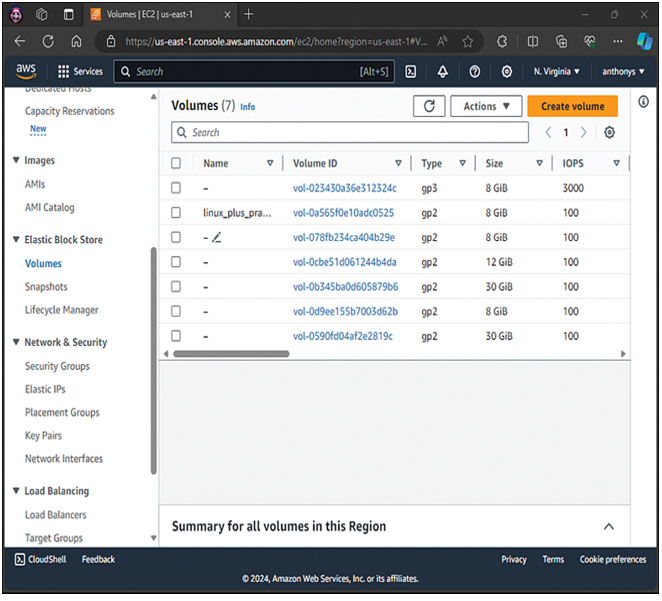Elastic Block Store (EBS)
When you spin up a virtual machine in the EC2 service of AWS, that machine is going to need a boot volume in order to function. AWS Elastic Block Store (EBS) provides persistent block storage volumes for use with EC2 instances in the AWS Cloud. Each Amazon EBS volume is automatically replicated within its Availability Zone to protect you from component failure, offering high availability and durability.
EBS volumes offer the consistent and low-latency performance needed to run your workloads. With Amazon EBS, you can scale your usage up or down within minutes—all while paying a low price for only what you provision. Figure 16-3 shows the EBS volumes in AWS on the EC2 dashboard.

Figure 16-3 EBS Volumes in AWS
Features of EBS include the following:
High-performance volumes: You can choose between solid-state disk (SSD)-backed and hard disk drive (HDD)-backed volumes that can deliver the performance you need for your most demanding applications.
Availability: Each Amazon EBS volume is designed for 99.999% availability and automatically replicates within its Availability Zone to protect your applications from component failure.
Encryption: Amazon EBS encryption provides seamless support for data at rest and data in transit between EC2 instances and EBS volumes.
Access management: Amazon’s flexible access control policies allow you to specify who can access which EBS volumes, ensuring secure access to your data.
Snapshots: You can protect your data by creating point-in-time snapshots of EBS volumes, which are backed up to Amazon S3 for long-term durability.
Elastic File System (EFS)
AWS Elastic File System (EFS) provides simple, scalable file storage for use with EC2 instances in the AWS Cloud, and it can also be used by on-premises servers in your organization. EFS is a fully managed AWS service that is easy to use. EFS offers a simple interface that allows you to create and configure file systems quickly and easily. Features of AWS EFS include the following:
Shared file storage: EFS permits multiple AWS EC2 instances to access the same EFS file system simultaneously.
Support for NFSv4: EFS offers robust support for Network File System version 4. This makes AWS EFS compatible with many systems that rely on NFS, including most Linux systems.
Data lifecycle management: Like AWS S3, EFS provides lifecycle management features that permit cost optimization through the automated movement of data between storage tiers.
File system access points: EFS supports access points, allowing you to create and manage application-specific access to your file systems. Access points provide a way to securely access a file system, and you can create multiple access points for different applications or user groups.
